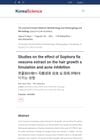 17 citations,
December 2001 in “Dermatologic therapy”
17 citations,
December 2001 in “Dermatologic therapy” Different treatments for alopecia areata have unpredictable results and varying success rates.
 14 citations,
April 2018 in “ACS Biomaterials Science & Engineering”
14 citations,
April 2018 in “ACS Biomaterials Science & Engineering” Nanoemulsion is a promising method for delivering luteolin to promote hair growth without minoxidil's side effects.
 12 citations,
July 2017 in “Scientific reports”
12 citations,
July 2017 in “Scientific reports” Researchers developed a way to study human body clocks using hair tissue, which works similarly in both healthy and dementia patients.
 9 citations,
December 2013 in “Toxicological Research”
9 citations,
December 2013 in “Toxicological Research” Chamaecyparis obtusa oil may help hair grow similarly to minoxidil by affecting certain growth markers and cell factors.
 6 citations,
March 2019 in “Dermatologic surgery”
6 citations,
March 2019 in “Dermatologic surgery” Chilled ATPv-supplemented saline best preserves hair grafts' key genes.
 5 citations,
January 2021 in “Biomedicine & Pharmacotherapy”
5 citations,
January 2021 in “Biomedicine & Pharmacotherapy” Policosanol helps treat hair loss by balancing hormones and supporting hair growth.
 1 citations,
December 2016 in “Trichology and cosmetology:”
1 citations,
December 2016 in “Trichology and cosmetology:” Panax ginseng might help with hair growth and has fewer side effects than synthetic treatments.
 January 2021 in “Journal of cosmetology & trichology”
January 2021 in “Journal of cosmetology & trichology” L-(+)-Tartaric Acid may help increase certain hair growth genes without harming cells.
12 citations,
January 2022 in “Cells” Dermal papilla cell vesicles can boost hair growth genes in fat stem cells.
6 citations,
November 1993 in “European journal of clinical pharmacology” Minoxidil is processed in the body by an enzyme found in the liver and platelets.
 2 citations,
May 2023 in “Marine Drugs”
2 citations,
May 2023 in “Marine Drugs” Marine-derived saccharides may help reduce aging effects on skin and hair by promoting cell growth and collagen production.
 October 2024 in “Biology”
October 2024 in “Biology” Dermal papilla cells can help regrow hair and are promising for hair loss treatments.
 2 citations,
May 2023 in “Plants”
2 citations,
May 2023 in “Plants” Allium hookeri extract may help promote hair growth and protect cells from damage.
 2 citations,
December 2022 in “Pharmaceutics”
2 citations,
December 2022 in “Pharmaceutics” The enzyme pyruvate kinase M2 helps hair regrowth and could be a potential treatment for hair loss.
July 2024 in “International Journal of Molecular Sciences” The inhibitor DPP can promote hair growth.
 July 2021 in “IntechOpen eBooks”
July 2021 in “IntechOpen eBooks” Ginseng, especially its component ginsenosides, can promote hair growth, reduce hair loss, and potentially treat conditions like alopecia by affecting cell pathways and cytokines.
 85 citations,
April 2012 in “PLOS ONE”
85 citations,
April 2012 in “PLOS ONE” Valproic Acid helps regrow hair in mice and activates a hair growth marker in human cells.
30 citations,
November 2020 in “Journal of Advanced Research” Conditioned medium from keratinocytes can improve hair growth potential in cultured dermal papilla cells.
 5 citations,
October 2022 in “Cosmetics”
5 citations,
October 2022 in “Cosmetics” Cell-based models help test if cosmetic ingredients really work for hair growth and skin health.
 5 citations,
May 2022 in “Biomedicines”
5 citations,
May 2022 in “Biomedicines” Botryococcus terribilis and its compounds may promote hair growth and improve hair health.
Platelet-rich plasma helps human hair cells grow and survive better.
 2 citations,
January 2002 in “The Journal of Korean Medicine Ophthalmology and Otolaryngology and Dermatology”
2 citations,
January 2002 in “The Journal of Korean Medicine Ophthalmology and Otolaryngology and Dermatology” Sophora flavescens extract helps hair grow and prevents acne.
 6 citations,
September 2020 in “Advanced Biology”
6 citations,
September 2020 in “Advanced Biology” Blue-light activation of TrkA improves hair-follicle stem cells' ability to become neurons and glial cells.
 3 citations,
September 2021 in “Journal of Food Science and Nutrition”
3 citations,
September 2021 in “Journal of Food Science and Nutrition” Red Ginseng Extract helps hair grow and improves skin health by stimulating cell growth and enhancing the body's antioxidant defense system.
 49 citations,
November 2014 in “Journal of Medicinal Food”
49 citations,
November 2014 in “Journal of Medicinal Food” Red Ginseng Extract may help human hair grow by activating growth pathways and blocking negative effects of certain hormones.
 15 citations,
August 2017 in “International Journal of Molecular Medicine”
15 citations,
August 2017 in “International Journal of Molecular Medicine” Panax ginseng extract may help prevent hair loss caused by DKK-1.
 21 citations,
January 2015 in “Journal of Dermatological Science”
21 citations,
January 2015 in “Journal of Dermatological Science” Ginsenosides in Panax ginseng boost hair growth like minoxidil.

The document discusses how traditional Chinese medicine extracts may affect hair growth in animals but lacks detailed results.
 24 citations,
January 2020 in “International Journal of Molecular Sciences”
24 citations,
January 2020 in “International Journal of Molecular Sciences” Some plants with flavonoids may help treat hair loss and promote hair growth.
 3 citations,
January 2021 in “Applied sciences”
3 citations,
January 2021 in “Applied sciences” Fermented red ginseng and a traditional herb mix improved hair growth in mice.

























